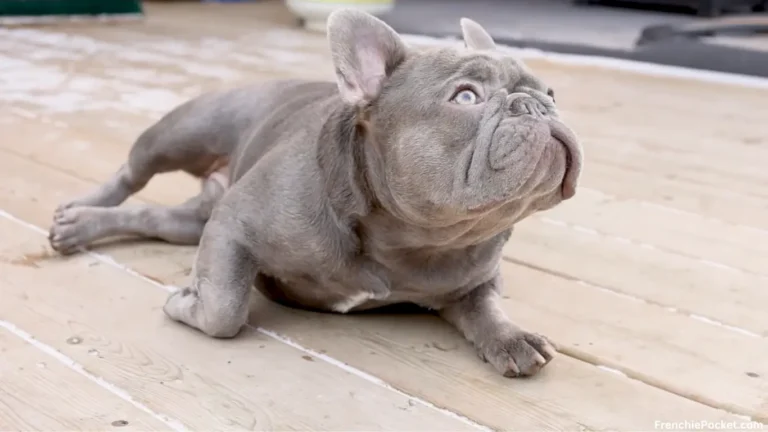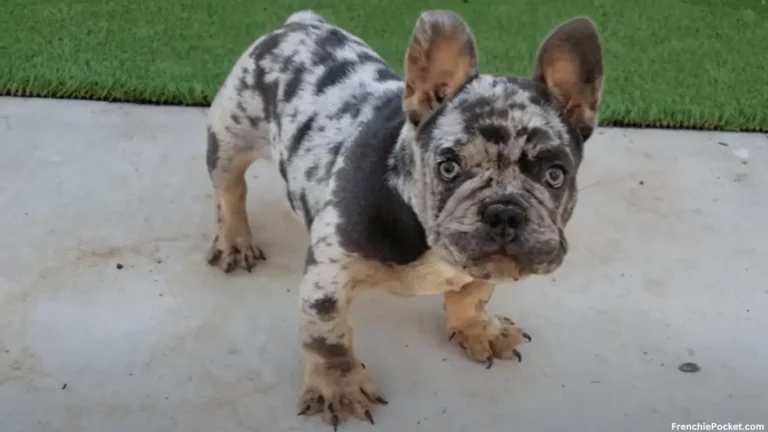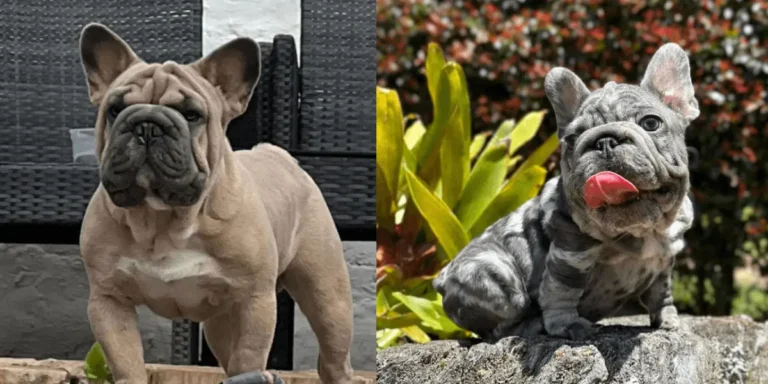Fluffy French Bulldog
In search of a cute and cuddly friend? The Fluffy French Bulldog has arrived! This adorable puppy has a round, squishy face, a little stature, and fluffy fur to win your heart over quickly.
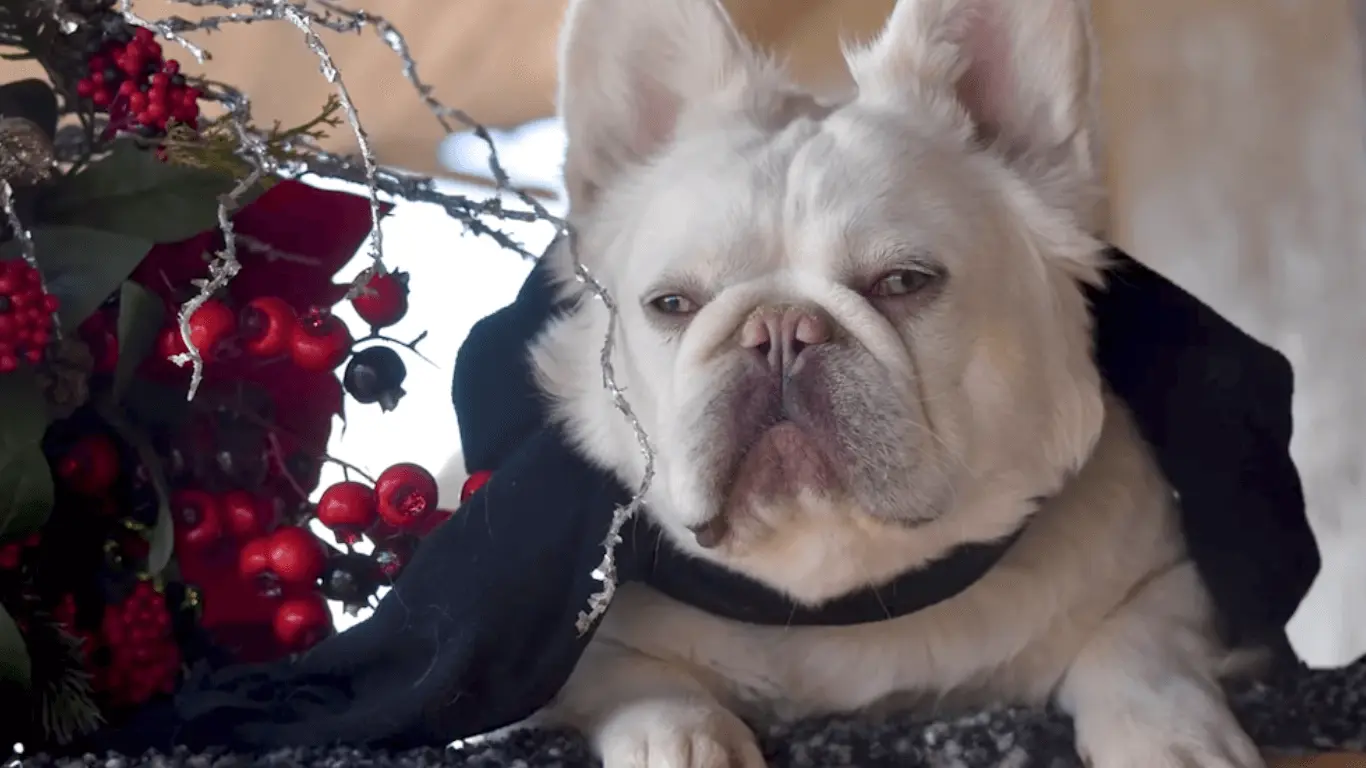
The Fluffy Frenchies are a great option for anyone looking for a loyal companion or a new family member because of their gentle demeanor and adorable appearance. Find out why every dog lover needs one of these adorable puppies.
What is a Fluffy French Bulldog?
A subtype of the French Bulldog, the Fluffy Frenchie, stands out for having exceptionally thick and soft fur. The Fluffy Frenchie differs from the regular French Bulldog by having a longer, wavy, and fluffy coat that gives it a teddy bear-like appearance and makes it perfect for cuddling.
This variant is the product of a recessive gene in some French Bulldogs. The longer, wavy, and fluffier breed gives it a unique and adorable appearance, especially around the ears. The LH, or long hair gene, the Fibroblast Growth Factor, is responsible for the unusual mutation known as the Fluffy French Bulldog.
| Breed Name | Fluffy French Bulldog |
|---|---|
| Origin | France |
| Breed Group | Non-sporting |
| Size | Small |
| Height | 11–12 inches (at the shoulder) |
| Weight | 16–28 pounds |
| Coat Type | Dense, soft, and fluffy |
| Coat Color | Various colors including white, cream, fawn, and black |
| Temperament | Affectionate, playful, loyal, and adaptable |
| Life Expectancy | 10–14 years |
Today’s Fluffy Frenchies are available in a rainbow of colors and patterns, ranging from the traditional black brindle to the more unusual lavender merle. However, the more unusual the coat of a Fluffy Frenchie, the higher the price might be due to the breed’s popularity and relative scarcity.
The Fluffy Frenchie is a great option with its adorable style that stands out. Many dog owners contend that the companionship they offer justifies the high cost of these fluffy pets.
What gives Fluffy French Bulldogs their appearance?
An uncommon genetic mutation that causes longer and wavier fur gives French Bulldogs their distinctive and lovable appearance. This variant is caused by a recessive gene called LH (long hair), also known as Fibroblast Growth Factor.
The hair of French Bulldogs with these gene alterations grows longer and wavier than the ordinary French Bulldog’s smooth and glossy coat. The end effect is a fluffy coat, most noticeable around the ears, which makes the animal look even cuter and cozier.
What makes Fluffy Frenchies so rare?
A Fluffy Frenchie’s long, wavy coat results from a recessive feature unusual in the breed. The fibroblast growth factor (LH, or long hair) gene is responsible for the coat’s signature softness and fluffiness. Developing a true “Fluffy” French Bulldog puppy requires its presence in both parents.
Breeding Fluffy Frenchies involves a lot of planning and ensuring that both parents contain the LH gene because of the rarity of this genetic mutation. In addition, breeders should use caution while reproducing these dogs, as improper handling of the gene can have unfavorable health effects on offspring.
Because of their growing notoriety, Fluffy Frenchies may soon be even harder to find and more expensive to purchase. As a result of their scarcity, Fluffy Frenchies are a popular subset of the adored French Bulldog breed.
Fluffy French Bulldog History
Having first appeared in the early 2000s, the Fluffy French Bulldog is a newer variant of the original French Bulldog breed. The Fluffy Frenchie’s signature fluffy coat results from a recessive gene called the long hair gene (the fibroblast growth factor gene), which must be present in both parents for kids to inherit the trait.
In 2002, the first Fluffy Frenchie puppy was born in the USA. A female French Bulldog puppy with an unusually long and wavy coat was given to a breeder named Linda Bradshaw and dubbed “Linda’s Lady Godiva.” As the first officially recognized example of the breed, Lady Godiva laid the groundwork for subsequent generations of Fluffy Frenchie.
Breeders should take extra precautions to maintain the health and well-being of these dogs because the long hair gene is still very uncommon in the French Bulldog community.
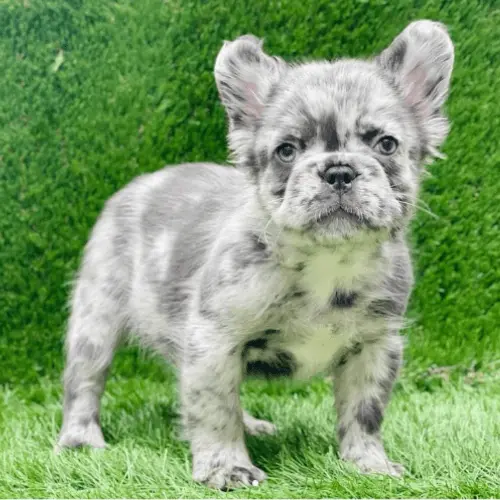
Does AKC recognize Fluffy Frenchies?
The American Kennel Club (AKC) only recognizes the conventional short-haired French Bulldog breed standard. The AKC does not recognize Fluffy Frenchie as a separate breed, but they can still compete in AKC events, including obedience trials, agility contests, and rally events.
The Fluffy Frenchie, for example, is recognized as a unique breed with its breed standard by the Continental Kennel Club (CKC) and the International Designer Canine Registry (IDCR).
It is crucial to remember that recognition by a certain kennel club does not necessarily reflect a breed’s quality or health. When selecting a breeder, conduct extensive research and enquire about their breeding practices and the health of their dogs.
The temperament of Fluffy Frenchies
Fluffy Frenchies are known for their cheerful, loving, and energetic personalities. They have the same friendly demeanor and get along with people and other dogs of all ages as their smooth-coated relatives.
Fluffy Frenchie has been known to build close ties with their human families because of their loyalty and devotion. They thrive on human company and love to do anything with their owners, from cuddling on the couch to running around in the yard.
They are responsive to rewards and good feedback. Such positive reinforcement strategies like treats and praise work well with them.
Fluffy Frenchies have moderate levels of energy, characterized by spurts of activity interspersed with mellower phases. They love going on walks and playing with their people daily but are also happy to hang out at home.
Are Fluffy French Bulldogs Hypoallergenic?
The Fluffy French Bulldog is not hypoallergenic, unfortunately. They may shed less than other dog breeds, but people with allergies should still know that their fur contains dander and allergens.
The long hair gene responsible for the fluffy coats of Fluffy Frenchies has been linked to an increased risk of skin allergies and irritations in humans.
Even though some dog breeds may release fewer allergens than others, some people may still be allergic to specific dogs.
Spending time around a Fluffy Frenchie before adopting one is a good idea for anyone who has allergies but still wants to bring one into their home. Grooming your Fluffy Frenchie regularly and keeping your home free of dog hair and dander can also aid in lowering allergy levels.
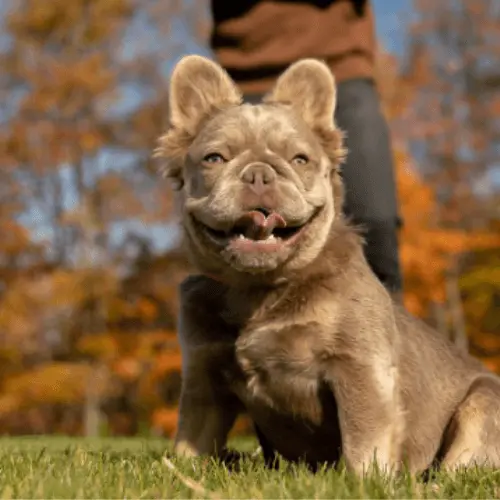
The ideal owner of a Fluffy Frenchie
The perfect owner for a Fluffy French Bulldog is someone who can give their pet the time, love, and attention it needs. Owners must spend lots of time playing and interacting with their fluffy Frenchies because this breed is extremely gregarious and friendly.
The owner of Fluffy Frenchies needs to be patient and prepared to put in the time and effort required to educate and socialize the dog properly because the dog can be difficult at times. These canines respond well to positive training methods like rewards and praise.
In addition, the owner must be able to afford reasonable veterinarian care, including monthly checkups, vaccinations, and preventative treatments for common health issues, because Fluffy Frenchies are predisposed to specific health difficulties, including respiratory problems and skin allergies.
The moderate activity level of the Fluffy Frenchie breed necessitates regular exercise and playing. The best way to ensure their activity needs are met is if their owner is prepared to take them on regular walks and play sessions.
Fluffy Frenchie Cost
The price of a Fluffy French Bulldog puppy can fluctuate based on several criteria, including the breeder’s location, the quality of the puppy’s ancestry, the color and pattern of the coat, and the breeder’s reputation.
The typical cost of Fluffy Frenchies is around $3,000. Some of these dogs can even fetch upwards of $10,000. Puppies from unusually low-priced breeders should raise red flags, which could indicate unethical breeding practices or health problems.

The expense of caring for a Fluffy French Bulldog extends much beyond the initial investment. Veterinary costs may increase over time due to potential health problems in these pets, such as allergies and breathing difficulties. In addition, their fluffy coats must be groomed regularly to keep them healthy and clean, which can add to the cost of upkeep.
Finding a trustworthy breeder who cares about the well-being of their puppies is essential if you want to get a Fluffy Frenchie. You should also be ready to provide your furry pet the care and attention it deserves, including frequent visits to the vet, playtime, and grooming.
Health Problems with Fluffy Frenchie
The long hair gene in Fluffy Frenchies makes them susceptible to additional health problems beyond those that affect standard French Bulldogs. The following are some of the most frequently seen medical problems in Fluffy Frenchies:
Dental Issues
Several dental problems can affect French Bulldogs, including Fluffy Frenchies. Their undershot jaws and short snouts make their teeth more likely to crowd together.
Periodontal disease, an infection of the tissues around the teeth, can develop as a result of excessive crowding. The French Bulldog’s jaw structure also makes it challenging for the breed to properly chew its food, which can contribute to an increased risk of dental decay.
To prevent tooth problems, Fluffy Frenchies need regular dental treatment. Giving them dental chews or toys can aid in teeth cleaning and developing positive chewing habits.
At least once a year, Fluffy Frenchies should visit the vet to have their teeth cleaned properly. This is in addition to the routine dental care they receive at home. At these checkups, the vet will remove tartar or plaque buildup, examine the mouth thoroughly, and treat any abnormalities found early.
If you take good care of your Fluffy Frenchie’s teeth and gums regularly, you can help them avoid more serious dental problems in the future.
Respiratory Problems
Like a typical French Bulldog, the short muzzle of a Fluffy Frenchie might cause breathing difficulties. Due to differences in skull structure, certain people may have trouble breathing normally.
Exercising or being outside in hot weather might exacerbate this breathing problem because the body needs more oxygen and the airways narrower. They may be short of breath, cough, snore, or pant excessively.
Fluffy Frenchies can develop various respiratory problems, so it’s vital to be aware of them and take preventative measures. This could mean doing less physical activity on hot days, staying inside, having enough drink and shade available, and not pushing oneself too hard. Your veterinarian should be consulted often to check your Fluffy Frenchie’s respiration and treat any underlying respiratory conditions.
Breathing problems in brachycephalic breeds like Fluffy Frenchies can sometimes be fixed with surgery. However, the best defense against respiratory problems is a lack of them through careful management of their environment and activity.
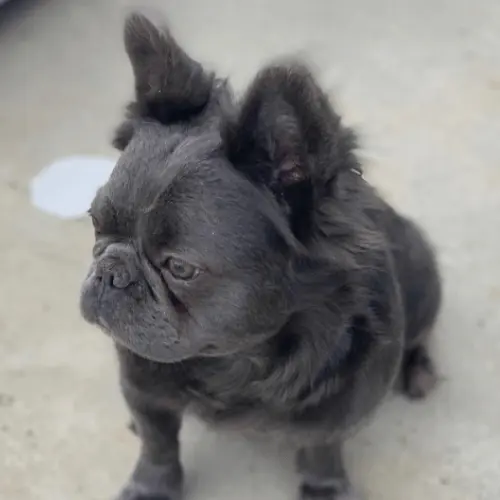
Eye Issues
Due to their genetics and face form, Fluffy Frenchies may experience eye problems. Cherry eye, in which the swollen tear gland of the eye protrudes through the upper eyelid, is a common condition that can impair their eyes. This may lead to eye redness, edema, and discharge; surgical intervention may be required.
Dry eye syndrome, in which the eye does not generate enough tears to keep it moist, is another problem that can damage Fluffy Frenchies’ eyes. This can raise the risk of eye infections and produce irritation, redness, and discharge from the eye. Eye drops or ointments are commonly used to treat dry eye syndrome because they lubricate the eye and increase tear production.
Because of their unique facial form, Fluffy Frenchies are also at risk for common eye problems like inflammation and infections. If they don’t keep the creases around their eyes clean, they might get irritated and even infected.
Fluffy Frenchies need to go in for regular checkups to keep their eyes healthy. Keeping an eye out for signs of irritation, redness, or discharge can be as simple as periodically cleaning the area around your dog’s eyes or as involved as using dog-specific eye drops or ointments as prescribed by your vet. Avoid further harm to your Fluffy Frenchie’s eyes by getting them checked as soon as you notice any worrying symptoms.
Skin Allergies
Due to a genetic predisposition, certain Fluffy Frenchies experience skin allergies or irritations. If you don’t treat these allergies, your skin may become itchy, red, and infected. Allergens like pollen or dust might get trapped by the long hair gene, causing skin irritation and allergic responses.
Folds and creases in a Fluffy Frenchie’s skin can trap dirt and moisture, making the dog more susceptible to skin infections and allergic reactions. If you don’t treat these infections, they can worsen and become life-threatening.

Keep your Fluffy Frenchie’s skin clean and dry to protect him from skin allergies and infections. They should take baths frequently, pat dry afterward, and wipe any creases or folds in their skin. You might also try feeding your dog hypoallergenic food or treats to lessen the likelihood of an allergic response.
Seek prompt veterinary attention if your Fluffy Frenchie develops a skin allergy or illness. Medication to alleviate irritation or inflammation, antibiotics to clear up any underlying infections, and topical therapies to calm and repair the skin are all potential options. You can help your Fluffy Frenchie avoid significant medical problems by acting quickly to treat skin allergies and infections.
Joint Problems
Joint issues, including hip dysplasia and patellar luxation, are common in French Bulldogs, notably Fluffy Frenchies. As a result, your dog may have pain, discomfort, and mobility concerns.
Hip dysplasia describes abnormal development of the hip joint. In contrast, patellar luxation is characterized by a kneecap dislocation, which results in pain and difficulty walking.
Your Fluffy Frenchie’s risk of developing these joint problems may increase due to the additional weight from their long fur. Maintaining a healthy weight for your Fluffy Frenchie can help prevent joint problems later in life.
Maintaining healthy joints in your Fluffy Frenchie requires regular activity and a nutritious diet.
Depending on the severity of your Fluffy Frenchie’s joint problems, your veterinarian may offer medicine, physical therapy, or surgery. Your Fluffy Frenchie’s quality of life and the likelihood of survival would be greatly enhanced by prompt diagnosis and treatment.
Frequently Asked Questions
What is the definition of a Fluffy French Bulldog?
A Fluffy Frenchie is a French Bulldog breed with longer fur than the typical short-haired French Bulldog. This is because they have the LH (long hair) gene, which gives them a distinctive and fluffy appearance.
Fluffy French Bulldogs are hypoallergenic?
Fluffy Frenchies, on the other hand, are not hypoallergenic. Even though their fur is longer, they can still shed and create dander, triggering allergies in some people.
What are some of the most common health problems in Fluffy French Bulldogs?
Fluffy Frenchie is susceptible to the same health difficulties as typical French Bulldogs, including respiratory disorders, dental issues, eye problems, skin allergies, and joint problems.
What are the prices of Fluffy French Bulldogs?
Due to their uniqueness and distinct appearance, Fluffy Frenchies might be more expensive than typical French Bulldogs. Prices can range from a few thousand dollars to tens of thousands depending on the breeder and the dog’s pedigree.
When looking for a Fluffy Frenchie breeder, what should I look for?
Look for a breeder who tests their dogs’ health, provides a clean and safe living environment, and is open about their breeding practices.
Conclusion
Fluffy French Bulldogs are a subset of the French Bulldog breed that originated in the United Kingdom and have become increasingly popular in recent years due to their fluffy, cute appearance. Although they are still uncommon and costly, they are wonderful pets for people who want a petite, loving, and active dog.
However, Fluffy Frenchie, under their breed and longer fur, may be predisposed to particular health difficulties; hence, it is essential to provide frequent veterinary treatment and attention. If you want a Fluffy Frenchie, you should look into your area’s breeders to ensure they produce healthy and happy dogs.




